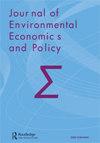The impact of income inequality and economic complexity on ecological footprint: an analysis covering a long-time span
IF 1.2
Q3 ENVIRONMENTAL STUDIES
Journal of Environmental Economics and Policy
Pub Date : 2021-05-19
DOI:10.1080/21606544.2021.1930188
引用次数: 40
Abstract
ABSTRACT Income inequality and economic complexity impacts on ecological footprint were researched for a panel of twenty-five countries, from 1970 to 2016, using the panel quantile regression approach. Results support that the economic complexity index in the 10th and 25th quantiles and pooled OLS regression positively affects ecological footprint, but not in the 75th and 90th quantiles. Gross Domestic Product in the 10th, 25th, 50th, 75th, and 90th quantiles have a positive effect on ecological footprint. Consumption of fossil fuels and population growth positively affects the ecological footprint in 10th, 25th, 50th, 75th, and 90th quantiles and the pooled OLS. Income inequality in the 10th, 25th, and 50th quantiles and the OLS model regression positively affect ecological footprint. Economic openness in 10th, 25th, 50th, 75th, and 90th quantiles and the pooled OLS negatively affect ecological footprint. Policymakers should promote policies to (i) encourage investment in green energy technologies and implement upgraded energy and environmental laws; (ii) diversify exports and sophisticate products in countries with a high ecological footprint; (iii) depth of human development to control for the population growth and stimulate the economic complexity; (vi) negotiate international trade agreements to open the economy; (v) implement measures to curb income inequality.收入不平等和经济复杂性对生态足迹的影响:一个长期的分析
摘要1970年至2016年,使用面板分位数回归方法,对25个国家的收入不平等和经济复杂性对生态足迹的影响进行了研究。结果表明,第10和第25分位数的经济复杂性指数和合并OLS回归对生态足迹有正向影响,但在第75和第90分位数没有。第10、25、50、75和90分位数的国内生产总值对生态足迹有积极影响。化石燃料的消费和人口增长对第10、25、50、75和90分位数以及汇总OLS的生态足迹产生了积极影响。第10、25和50分位数的收入不平等和OLS模型回归对生态足迹有积极影响。第10、第25、第50、第75和第90分位数的经济开放度以及汇总的OLS对生态足迹产生负面影响。政策制定者应推动以下政策:(i)鼓励对绿色能源技术的投资,并实施升级后的能源和环境法律;(ii)在生态足迹高的国家实现出口多样化和产品精细化;(iii)人类发展的深度,以控制人口增长和刺激经济复杂性;(vi)谈判国际贸易协定以开放经济;(v) 实施遏制收入不平等的措施。
本文章由计算机程序翻译,如有差异,请以英文原文为准。
求助全文
约1分钟内获得全文
求助全文
来源期刊

Journal of Environmental Economics and Policy
ENVIRONMENTAL STUDIES-
CiteScore
4.70
自引率
7.70%
发文量
26
 求助内容:
求助内容: 应助结果提醒方式:
应助结果提醒方式:


